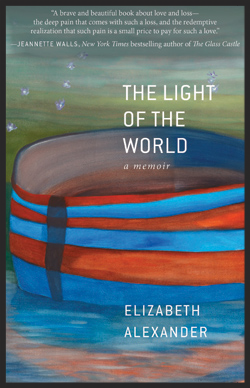Elizabeth Alexander’s The Light of the World, a memoir about coping with her husband’s death, opens with an explanation of how to understand beginnings: “The story seems to begin with catastrophe but in fact began earlier and is not a tragedy but rather a love story.” Within this understanding, the story of Alexander’s loss began with her husband’s death on a Wednesday evening in early April 2012; it began when they met by chance at a café in New Haven in 1996 and fell in love instantly; it began when their mothers were each pregnant with them in the winter of 1961, thousands of miles apart.
But while love is the pervasive theme of the memoir, Alexander didn’t realize she was writing a love story until midway through the book. At a recent reading at Hyde Park’s Seminary Co-op, she talked about the process of writing The Light of the World, which came out last month. The audience was filled with old acquaintances from her Hyde Park days—she taught at the University of Chicago for several years in the 1990s, leaving Chicago when she met and settled down with her husband Ficre in New Haven—and as she sat down at the front of the bookstore, backlit by the view of a rainy Woodlawn Avenue, she prefaced the reading by addressing the faces before her with a smile: “I’m not even focusing on all of you because there’s just too much story. I need to blur you all out so I can do my work.”
Alexander, a long-time poet, never imagined that she would write a memoir. After a long break from writing following Ficre’s death, she began writing again to give a name to her pain and to fix in place her memories of life with her husband. While the book was initially intended as poetry, she explained “it came from the same place where poetry lives and then went and moved in another direction.” She is, however, a poet at heart, and the memoir is written in a series of short essays, sometimes unrelated and sometimes overlapping—what Alexander calls “poet’s chapters.”
In The Light of the World, love is as inevitable as death; Alexander understood early on that “loss is not felt in the absence of love.” Her husband Ficre’s death at age fifty from a sudden heart attack was unavoidable: “the heart inside of him beat all the beats it was allocated.” But the love of the two also “began in an instant and progressed inevitably;” their lives were fated to converge, and remain forever intertwined. A love story that began with a chance encounter in a café in New Haven, brought about “a three-day, three-night vortex” of passion, and ended with Ficre breathing his last breath as she kneeled over his dying body, is enough to convince one of the existence of star-crossed lovers.
The book—and the love between them—also takes as a recurring theme the African diasporic culture Alexander shared with her husband. Ficre was born in Eritrea on the brink of the country’s three decade-long war for independence, and spent his young adulthood living amidst the realities of warfare. Those experiences strongly influenced the paintings he started to create after he fled his home country as a refugee and settled down in New Haven. Alexander’s poetry is also deeply influenced by her African-American roots—race and historical memory are two of the main themes running through her poems. Their marriage became a combination of their favorite parts of each of their diasporic cultures: recipes were shared and influenced by each other, stories and music were exchanged and experienced together, and a large network of extended African family from throughout the world came together under the rooftop of their New Haven home for a shared Easter meal for each of the fifteen years the two were married.
When asked by an audience member how writing the book affected her grieving, Alexander was quick to distinguish between the grieving process and the writing process. “I think of them as two processes that went on at the same time and sometimes overlapped,” she admitted. Both, however, consumed her during the three years between Ficre’s death and the book’s release. “I had no idea I had this much in me,” she confessed, looking down at the finished product in her hands.



